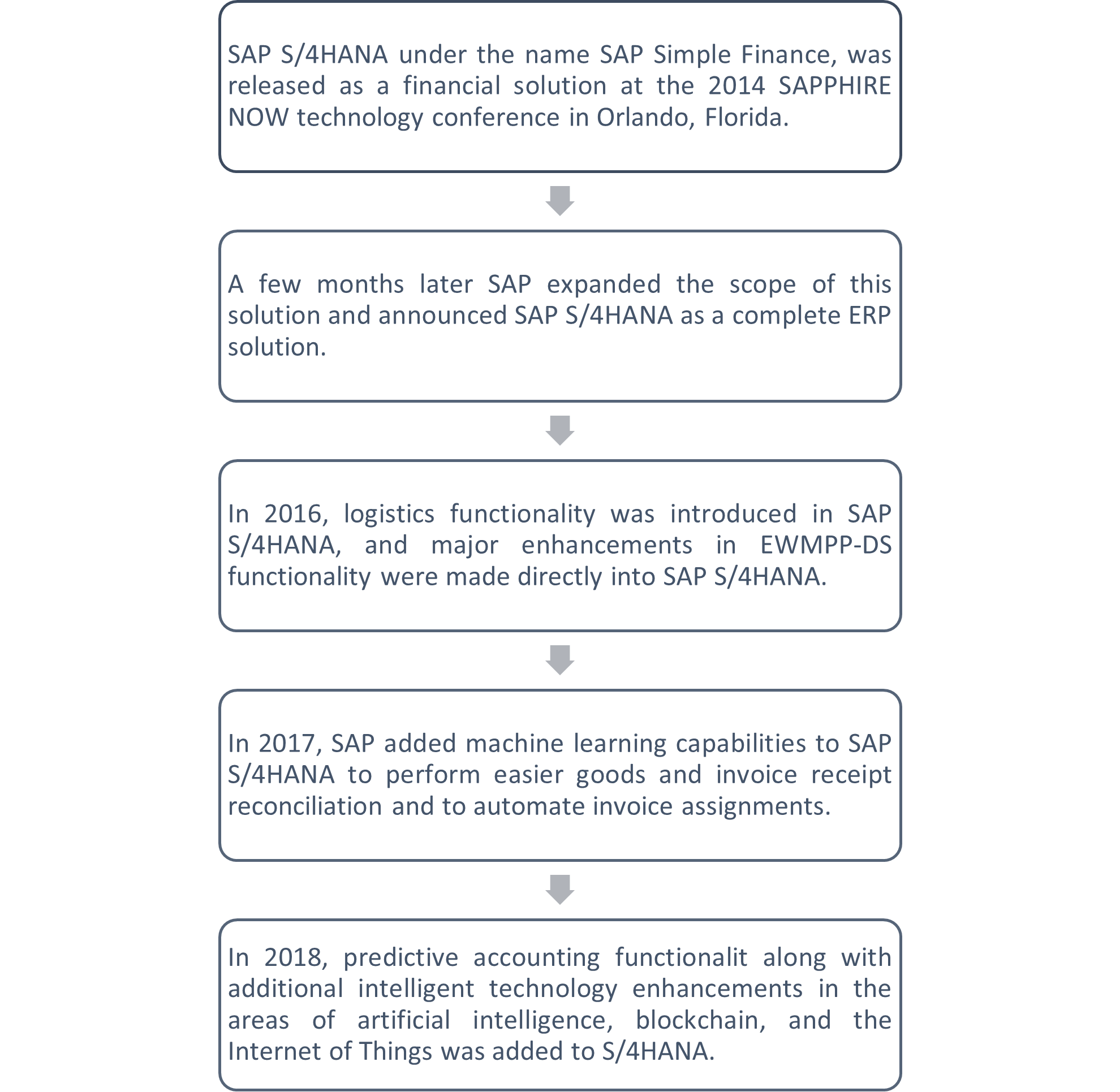What is SAP S/4HANA | Difference between SAP S/4HANA and SAP ECC
What is SAP S/4HANA?
SAP S/4HANA is an application enterprise suite based on the SAP HANA in-memory database, which allows real-time analysis of data and facilitates organizations to perform transactions.
SAP S/4HANA was first released in 2015 as a digital transformation to modify or create new business processes and modules. S/4HANA increased business flexibility to adapt to changing business requirements.
History of SAP S/4HANA

What is SAP S/4HANA best suited for?
SAP S/4HANA is a complex ERP system with a wide spectrum of capabilities that are designed to fit the complex requirements of large organizations to streamline their business processes.
S/4HANA is integrated with various functionalities such as AI, machine learning, blockchain, and advanced analytics, in addition to a built-in HANA in-memory database to enable real-time analytics and transactions.
As opposed to SAP B1 which is best suited for small organizations, the complex nature of SAP S/4HANA makes it a better option for large organizations.
SAP S/4HANA Lines of Business
SAP S/4HANA was initially introduced as a finance-centric ERP solution, but over the years, SAP has added various modules to enhance its functionality and cover different areas of the business. The core modules of the traditional SAP ERP system were reorganized into lines of business (LoBs) in S/4HANA to better align with the business processes of modern organizations. These LoBs include finance, sales, procurement, manufacturing, supply chain, research and development, and asset management. Each LoB consists of various modules that cover specific business processes and activities.
The core modules of SAP ERP have been reorganized into lines of business (LoBs) as discussed below,
S/4HANA Finance
SAP S/4HANA Finance LoB focuses on the financial activities of an organization including financial accounting, financial planning, consolidation, and so on.
S/4HANA Logistics
SAP S/4HANA Logistics LoB comprises supplier chain management and supply chain management solutions, including the following,
S/4HANA Sourcing and Placement focuses on activities related to sourcing and obtaining raw materials to fulfill production needs, operational purchasing, and supplier and contract management.
S/4HANA Manufacturing assists in manufacturing procedures including responsive manufacturing, production operations, scheduling and delivery planning, and quality management.
S/4HANA Supply Chain focuses on the pre-production, the dispatch of products, and the end purchase. This includes product planning, batch traceability, warehousing, inventory, and transportation management.
S/4HANA Asset Management is focused on the maintenance of fixed assets of the organization including plants, warehouses, tools, machinery, and so on. This includes plant maintenance and EHS monitoring.
SAP S/4HANA Sales
The SAP S/4HANA Sales LoB assists in fulfilling sales orders, managing pricing, sales inquiries and quotations, sales contracts and agreements, packing, billing, revenue, and so on.
S/4HANA R&D and Engineering
The R&D and Engineering LoB in SAP S/4HANA focuses on the product lifecycle, from the product structure to the end pricing. This includes material requirements, project and portfolio, innovation management, health, and safety regulatory compliance, and so on.
SAP S/4HANA deployment
SAP S/4HANA was initially deployed as an on-premises ERP with the option for users to deploy the software on the cloud with S/4HANA Cloud which is a different product than standard SAP S/4HANA. Here is a brief overview of the various deployment options of SAP S/4HANA.
On-premises Deployment
SAP S/4HANA on-premises deployment is physically hosted by the organization and encompasses the in-house IT infrastructure. The on-premises deployment gives the organization the option to choose from,
System conversion implementation (brownfield) whereby the existing SAP environment is transformed into SAP S/4HANA,
Or a new implementation (greenfield) where business data is migrated from the existing SAP environment to a new S/4HANA system,
Or selective data transition where the existing ERP process is reused in a new system by using shell conversion.
Cloud Deployment
SAP S/4HANA has multiple cloud options for deployment using external cloud integration.
SAP S/4HANA cloud deployment places the organization’s solution instance on a partitioned cloud, making the functional scope limited because of a standardized setup. Private cloud deployment of S/4HANA provides the application functionalities on their own cloud, curbing the limitations of standard cloud deployment.
Hybrid
Hybrid deployment of S/4HANA provides the best of both on-premise and cloud. This deployment model might be used to check the feasibility of both instances or hosting an on-premise deployment center while utilizing the benefits of the cloud.
What is the difference between SAP S/4HANA and SAP ECC?
SAP S/4HANA necessarily encompasses the features of various previous SAP ERP products including ECC. At its core, S/4HANA was redesigned to include the capabilities that were missing in ECC such as advanced analytics and real-time processing. Let us understand the key differences between SAP S/4HANA and SAP ECC,
|
|
SAP S/4HANA
|
SAP ECC
|
|
Database
|
S/4HANA runs only on HANA.
|
ECC runs on various databases including DB2, Oracle, SQL, and so on.
|
|
Architecture
|
SAP S/4HANA has a simplified model that makes use of a universal journal.
|
ECC on the other has additional indexes and aggregate tables.
|
|
User Experience
|
S/4HANA uses SAP Fiori UX
|
ECC uses a traditional user interface that may require more training to use
|
|
Integration
|
S/4HANA offers more streamlined integration with other SAP solutions, such as SAP SuccessFactors, Ariba, and Concur.
|
SAP ECC requires additional middleware and customization to integrate with these solutions.
|
|
Industry-specific functionality
|
S/4HANA offers industry-specific functionality, such as for oil and gas, retail, and manufacturing
|
These functionalities are not available in SAP ECC.
|
To know more about SAP S/4HANA implementation or migration of ECC to S/4HANA, visit: Webtel